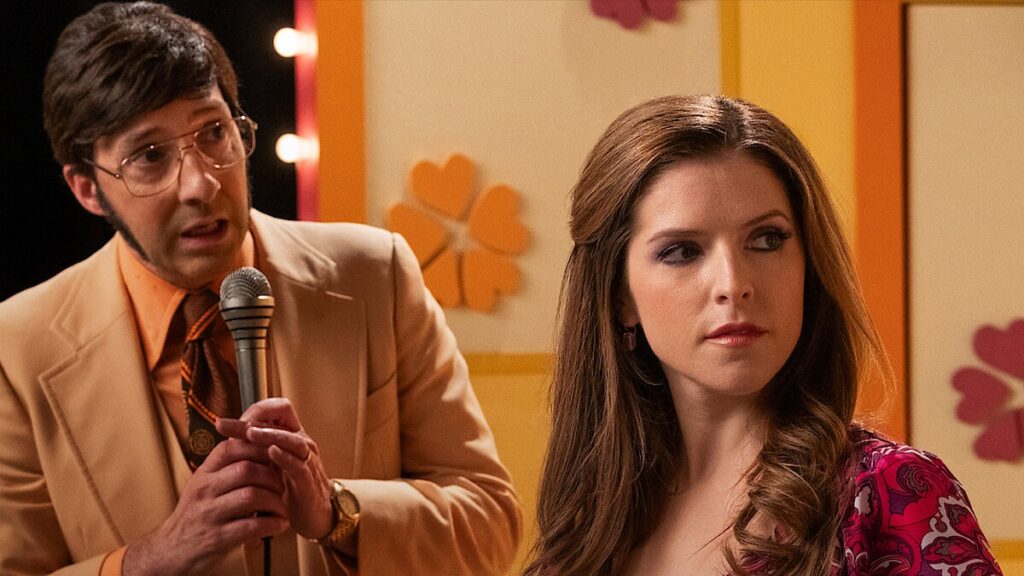“Woman of the Hour,” directed by Anna Kendrick, offers a unique and thrilling look at the perils of fame, ambition, and the consequences of one’s actions. A film that expertly blends drama, suspense, and human psychology, it is an enthralling journey into the dark side of the entertainment industry and the societal pressures that drive individuals to succeed at any cost.
Plot Overview:
The movie follows the story of a young woman, Jenny (played by Anna Kendrick), who finds herself thrust into the spotlight after a public scandal. She is quickly dubbed the “woman of the hour” due to her rise in popularity, but the film soon reveals that her newfound fame is not all it’s cracked up to be. Jenny becomes entangled in a dangerous game of manipulation, power struggles, and personal dilemmas as she attempts to navigate the complicated web of the media and her own insecurities.
While the plot focuses on Jenny’s rise to fame, it also dives deeply into the exploitation of women in the entertainment industry. The film is a reflection on how the media’s perception of a person often overshadows their true self and highlights the perils of living up to impossible societal expectations.
Character Development:
Anna Kendrick’s portrayal of Jenny is one of the highlights of the film. She brings a sense of vulnerability and strength to her character, making Jenny both relatable and enigmatic. Kendrick’s ability to juggle the complexity of her character’s emotions—ranging from insecurity to self-assuredness—gives the movie a solid emotional backbone. As Jenny is thrust into the spotlight, Kendrick’s performance is a poignant exploration of what happens when personal identity is put under the microscope of public scrutiny.
Other characters in the film, such as Jenny’s manager (played by a standout supporting actor), serve to create the tension that drives the story forward. These secondary roles further expose the nature of manipulation, ambition, and the personal cost of success in an industry that is ruthless and indifferent. Through their interactions with Jenny, the film paints a grim picture of the power dynamics at play in modern society, particularly in Hollywood.
Themes and Social Commentary:
One of the most striking aspects of “Woman of the Hour” is its sharp critique of the entertainment industry and the way it commodifies people. It explores how the quest for fame can strip away one’s identity, leaving behind a shell of the person they once were. Jenny’s character arc is a testament to this, as she becomes increasingly consumed by the expectations of others, sacrificing her own values in the process.
The film also addresses the gender dynamics in the world of fame. Jenny, as a woman in a male-dominated industry, faces constant pressure to be “perfect” in both her professional and personal life. The movie tackles the double standards that women face, particularly the way the media and society place them under a microscope, judging their every move, while often excusing the missteps of their male counterparts. The film’s portrayal of Jenny’s struggles is a timely commentary on the challenges that women continue to face in today’s society, particularly those in the public eye.
Another theme that runs through the film is the idea of power and control. Jenny’s rise to fame gives her a taste of power, but she soon realizes how fleeting and fragile it is. The film raises important questions about the cost of ambition and the lengths people will go to maintain their status. Jenny’s evolution throughout the movie is not just about her rise to fame, but about her realization that true power comes not from the attention of others, but from self-awareness and personal integrity.
Direction and Cinematography:
Anna Kendrick’s transition from actor to director is an impressive one. Her directorial debut is a tight, engaging film that maintains a careful balance between drama and suspense. Kendrick demonstrates a keen understanding of pacing, with each scene building tension in a way that keeps the audience engaged throughout. The film’s pacing is sharp, keeping viewers on edge while still allowing for moments of reflection on the emotional toll fame takes on the character.
The cinematography in “Woman of the Hour” is also noteworthy. The film utilizes lighting and color schemes to reflect the inner turmoil of Jenny’s character. The juxtaposition of bright, glamorous shots of her life in the public eye against darker, more somber scenes in private moments visually highlights the contrast between the persona she presents to the world and her true self. The cinematography effectively captures the emotional weight of the story, enhancing the audience’s connection to the characters and the themes.
Soundtrack and Score:
The soundtrack of “Woman of the Hour” complements the film’s mood and tone perfectly. The music, while subtle, plays an essential role in enhancing the emotional impact of the scenes. The score underscores the tension, while also providing a poignant backdrop for the quieter, more introspective moments in Jenny’s journey. The careful choice of songs and instrumental pieces heightens the overall experience, making the emotional beats of the story resonate even deeper.
Cultural and Psychological Impact:
Beyond its entertainment value, “Woman of the Hour” provides a compelling exploration of the psychological effects of fame. Jenny’s internal conflict and the toll that her public image takes on her mental health are central to the film. It’s a sobering reminder of the importance of maintaining a sense of self in a world that constantly pushes individuals to conform to external standards.
The film also brings attention to the way media consumption shapes public perception. The rapid rise and fall of individuals in the entertainment industry are not new, but “Woman of the Hour” serves as a cautionary tale, illustrating how quickly a person’s image can be distorted and manipulated by the very system that elevates them. In a society obsessed with celebrity culture and instant gratification, the film forces the audience to reflect on the price of fame.
“Woman of the Hour” is a captivating, thought-provoking film that explores the complexities of fame, ambition, and personal identity. With Anna Kendrick’s impressive direction and a strong performance at the heart of the film, it offers a fresh perspective on the entertainment industry and its impact on the people within it. The movie is a sharp commentary on the pressures of living up to societal expectations, particularly for women in the public eye.
With its compelling performances, gripping narrative, and timely social commentary, “Woman of the Hour” is a must-watch for anyone interested in the intersection of celebrity culture, media influence, and personal identity. The film not only entertains but also challenges the viewer to question the true cost of success and fame in the modern world.
Rating: 4.5/5


























